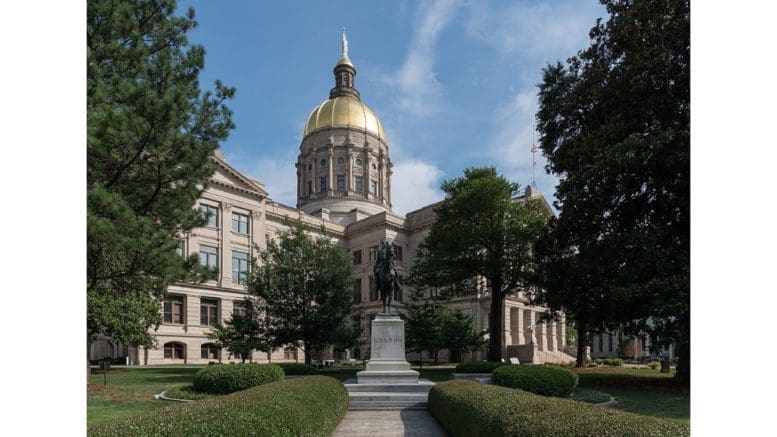by Alander Rocha, Georgia Recorder, [This article first appeared in the Georgia Recorder, republished with permission]
August 19, 2025
Georgia officials discussed eliminating the state income tax Tuesday but provided little detail on how to do so.
Lt. Gov. Burt Jones, who is campaigning to be Georgia’s next governor, helped kick off the first meeting of the Senate Special Committee on Eliminating Georgia’s Income Tax.
“If we want to continue to stay competitive here in the state of Georgia, and continue to be the number one state to do business, we’ve got to be looking for ways to keep us competitive and make it where we have a competitive advantage over states that we are competing with all the time,” Jones said at the start of the meeting.
The goal, lawmakers discussed in the committee, is to make Georgia more competitive with neighboring states that have no income tax, such as Florida and Tennessee, and states that are in the process of eliminating its income tax, such as Mississippi and North Carolina.
Personal income taxes are estimated to account for 41.6% of Georgia’s estimated revenue for the current budget year, which started on July 1, according to the Governor’s Office of Planning and Budget. With corporate income tax included, which officials indicated would be reduced along with personal income tax, that number rises to just over 50% of all state revenues.
Danny Kanso, senior fiscal analyst at the Georgia Budget and Policy Institute, said after the meeting that he’d “like to see the math on that.” He said that for most of Georgia’s households, eliminating the income tax would amount to a “massive” tax increase. The state would have to triple the sales tax and expand the sales tax to new products to make up for the deficit, calling it “a very tall order to replace the state’s largest source of revenue.”
“The proposal would have to increase taxes on far more Georgians than it would reduce taxes on, and so it’s a little bit of a solution in search of a problem that would likely cause ripples all across the state and across the economy as well,” Kanso said.
But Grover Norquist, president of the Americans for Tax Reform, a conservative organization advocating for tax cuts, said that it’s possible for Georgia to eliminate its 5.19% income tax rate without increasing sales tax. He argued that eliminating the income tax could still allow the state budget to increase through sales tax revenue as Georgians would have more income to spend.
“When you attract more people into the state and more business into the state and more investment into the state, you end up with both more money for individuals earning it, but also more tax revenue at lower rates,” Norquist said.
He said that Florida, which does not tax income, “makes more money every year from sales tax and other taxes that aren’t going up. There’s more money because there are more people with higher earnings who have more resources who move to Florida.”
Norquist also said that with tariffs the Trump administration is imposing on other nations to promote domestic manufacturing, eliminating the income tax would make Georgia a more attractive state for industries looking to move manufacturing to the state.
“President Trump put in a lot of incentives for people to invest in the United States. There are still 50 choices,” he said.
Sen. Nan Orrock, an Atlanta Democrat, saying that lawmakers are tasked with “meeting the needs of our population,” asked for clarification about how the Legislature could raise revenue at a time when the federal government is shifting the cost of disaster relief and food assistance programs to the states.
“How do you square reducing our state revenues with the needs that we have as a state, and the unknown needs that are going to happen as higher ed and K-12 [and] enormous cuts that are coming down from [the federal government]?” Orrock said.
Norquist did not say how the state could raise revenue but instead pointed to North Carolina, which has lowered its income tax rate but “spending has gone on every year.”
“It is going up because revenue is coming, and they have reduced marginal tax rates and revenue has come in higher than before,” he said.
Kanso called it “wishful thinking,” saying that relying on growth is not a “viable path to raise $19 billion a year and replace more than 50% of the state budget.”
“[It] doesn’t really make sense when you hear we’re going to lower taxes, eliminate sources of revenue, and somehow we’re also going to raise more money,” Kanso said. “That’s not something we’ve really seen work in the past.”
Georgia Recorder is part of States Newsroom, a nonprofit news network supported by grants and a coalition of donors as a 501c(3) public charity. Georgia Recorder maintains editorial independence. Contact Editor Jill Nolin for questions: info@georgiarecorder.com.
